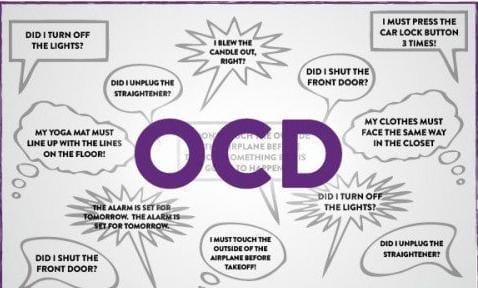Obsessive Compulsive Disorder Treatment What Even Is It?Posted by mentalhealthtv on April 27th, 2021 What is Obsessive Compulsive Disorder (OCD)? Obsessive Compulsive Disorder is an anxiety disorder characterised by intrusive thoughts and the rituals or compulsions a person might do to get rid of them. Everybody experiences anxiety, and everybody experiences intrusive thoughts. This is completely normal. However, some experience anxiety to a disruptive level, and this is when it is a problem. People with OCD experience intrusive thoughts, but struggle to let go of them, which is why they find themselves needing to perform rituals and compulsions to 'get rid' of the intrusive thought that is making them anxious. Misconceptions about Obsessive Compulsive Disorder Every day, people misuse the term 'OCD', which trivialises the disorder and leads to people misunderstanding the seriousness of it. Examples of this misuse would be when somebody uses 'OCD' as an adjective to describe that they like things to be tidy, neat or clean. While some peoples' rituals and compulsions may include cleaning or making things 'neat', this is not the case for every case of OCD, and there is a lot more to it than just making a room pleasant. Somebody with intrusive thoughts about germs might hoard various soaps, anti-bacterial gels and shower gels. They might over-wash their hands every time they have an intrusive thought relating to it, and they might have to do this a certain number of times for things to feel 'right'. Others with OCD may be extremely superstitious, and their rituals and compulsions may revolve around the superstitions. Then there are the not so obvious compulsions that can be done mentally – counting, ruminating, correcting negative thoughts. Reassurance seeking is also a compulsion which somebody might easily be able to disguise by guiding conversations in the direction that they want them to go.
Obsessive Compulsive Disorder Treatment Every person with OCD has their own obsessions and the way each person is affected by OCD can be different, even if the obsessions are the same. One of our programmes on OCD shows a patient who is very obsessed with the possibility that her food could be contaminated with peanuts, and that she would die. The most interesting part about this obsession is the fact that she is not even allergic to peanuts. Her compulsions are mainly hand-washing. The programme shows how this is treated through exposure response prevention therapy – exposing her to her fear in small amounts, gradually allowing her anxiety levels to lift and lower until she is able to eat a chocolate bar that has peanuts in it. Cognitive behavioural therapy may also be an element of treatment for OCD, and use of medication for anxiety. Why don't people just stop performing the rituals and compulsions? This is easier said than done. Every ritual and compulsion temporarily reduces the extreme anxiety that the sufferer feels, to the point that the anxiety may be too much to bear the next time it comes around. The sufferer may increase the frequency or length of the rituals/compulsions to compensate for the increase in anxiety. It is much better to start reducing rituals and compulsions in small steps. For example, if somebody has an intrusive thought about contamination and they feel the need to wash their hands again, they may be told to try and wait 10 minutes before acting on the compulsion. The 10 minutes will be a very anxious 10 minutes, but there is a chance the anxiety may reduce a little towards the end of 10 minutes. These small steps can retrain the way the person responds to their intrusive thoughts. Like it? Share it!More by this author |



